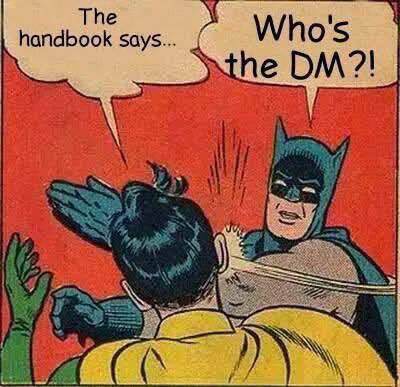It is important for players to trust their GM and for the GM to explain how they use the rules and run games. GMs should be both clear and fair in their presentation and application of the rules. They should strive to instill trust in their players. This is a follow up to yesterday’s blog post on rules lawyering, and is an expansion of episode 11 of the podcast.
Two Way Street
The relationship between the GM and players at the table (real or virtual) is a two way street between the GM and each player, as well as each player between every other player. The GM prepares the campaign setting/world to host the adventures, and also prepares for each adventure. They have to run and voice all the monsters and NPCs and keep track of all the things involved to keep the game moving.
Players should each do their part. Just as the GM works to show the players that they can trust him or her to run the game, the players should work to show the GM and other players that they fit in at the table.
What should the players do?
The following assumes a veteran player.
- Show up on time.
- If you are late, it delays the start of the game, or causes a pause in the action to get you up to speed
- If you are going to be late, it shouldn’t be a habit and you should let everyone know.
- Life happens and the unexpected can derail the most firm commitment.
- With online play this is also important.
- Bring what you need to play, character sheet, writing instrument, paper, dice, PHB or similar.
- Have your character sheet and inventory up to date and organized so the game can start on time, and you can find the information needed during play.
- Be ready to declare your action when it is your turn to act.
- Be familiar with your character’s class, abilities, equipment, and whatever else you need to know to play that character.
- Be courteous and respectful of others. (I shouldn’t have to say that. If you don’t know what this means, a bullet point can’t explain it.)
- Be welcoming of new players to the game. You are an ambassador to both your group and the wider RPG community.
- This is both experienced players new to your table.
- As well as new players who are new to the game. There are two variations:
- Players who have never played an RPG. Their experience at your table is their FIRST IMPRESSION of the game. They will assume all role players are jerks if they are treated poorly and won’t want to play.
- Experienced role players who are new to the rules of the game you are playing.
- Be willing to step outside your comfort zone. The GM has to do this, so you aren’t the only one.
- If you are a natural extrovert, play an introverted character occasionally. Encourage the less active players to take risks.
- If you are a natural introvert, play an extroverted character, or one who takes risks.
- Be willing to try your hand as GM.
- Your GM needs a break to let their batteries re-charge. Run a one-shot or short campaign.
- Do your part to help bring the campaign world alive. Suggest ideas for monsters, cultures, items, and more.
- Tell your GM what they get right more loudly and before you tell them what they did wrong.
- When you tell them what went wrong or you didn’t like, do it in a constructive way.
- If there is a problem at the table be part of the solution. If you’re the problem, recognize it when everyone else calls you out.
Conclusion
TTRPGs require an open mind, trust, and creativity for all concerned. Such games are a communal exercise in play. This type of play allows one to do things they can’t do in the real world. It is a communal activity that when players and GM come together, the fictional world comes alive. By trusting the GM and players buying in to the world and adventure presented, you will have memories as vivid as the ones you have of things you really did. Together you weave a story that will unite your group in a way that you can say, “Hey, remember that time?” and you will all laugh and no one else will ever quite understand.


